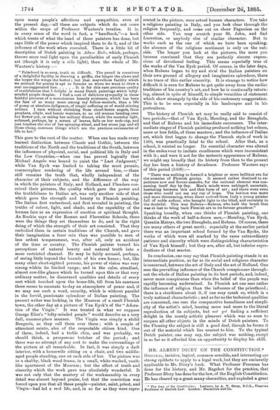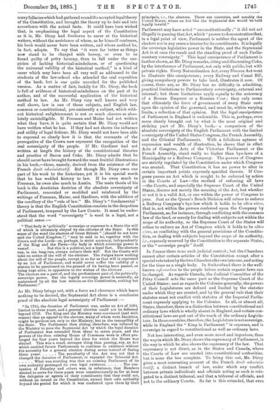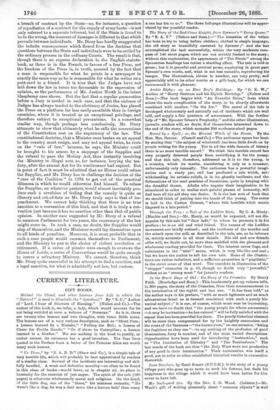MR. ALBERT DICEY ON THE CONSTITUTION.* ORIGINAL, incisive, logical, common-sensible,
and interesting are strong epithets to apply to a legal work,but they are eminently applicable to Mr. Dicey's book. What Professor Freeman has done for the history, and Mr. Bagehot for the practice, that Professor Dicey has done for the law, of the English Constitution. He has cleared up a great many obscurities, and exploded a great
• The Law if the Constitution. Lectures by A. V. Dieey, B.C.L., Tinerian Professor of English Law. London : Macmillan and Co.
many fallacies which had gathered round the accepted legal theory of the Constitution, and brought the theory up to date and into accordance with the actual facts. It could have been wished that, in emphasising the legal aspect of the Constitution as it is, Mr. Dicey had foreborne to sneer at the historical writers, without the assistance of whom, as he himself confesses, his book would never have been written, and whose method he, in fact, adopts. To say that "it were far better as things now stand to be charged with heresy, or even to be found guilty of petty larceny, than to fall under the sus- picion of lacking historical-mindedness, or of questioning the universal validity of the historical method," is a kind of sneer which may have been all very well as addressed to the students of the law-school who attended the oral exposition of the book, but is one quite unsuited for the published version. As a matter of fact, luckily for Mr. Dicey, the book is full of evidence of historical-mindedness on the part of its author, and of the successful application of the historical method to law. As Mr. Dicey very well knows and very well shows, law is one of those subjects, and English law, common or constitutional, pre-eminently a subject, which with- out historical enlightenment is not so much obscure as abso- lutely unintelligible. If Freeman and, Maine had not written what they have, it is quite certain that Mr. Dicey would not have written what he has. If they had not shown the influence and utility of legal fictions, Mr. Dicey would not have been able to expound so clearly how it is that the remnants of the prerogative of the Crown now represent the recognition of the real sovereignty of the people. If Mr. Gardiner had not written at length the history of the constitutional theories and practice of Bacon and Coke, Mr. Dicey admits that he should never have brought forward the most fruitful illustrations in his book,—those, namely, derived from the existence of the French droll administratit But though Mr. Dicey owes one part of his work to the historians, yet it is his special merit that he has wedded history to law. If he owes much to Freeman, he owes also much to Austin. The main thesis of his book is the Anstinian doctrine of the absolute sovereignty of Parliament, renovated or modified and reinforced by the writings of Freeman, Maine, and Gardiner, with the addition of the corollary of the "rule of law." Mr. Dicey's " fundamental " theory is that the English Constitution consists in the despotism of Parliament, tempered by the Law Courts. It must be under- stood that the word " sovereignty " is used in a legal, not a political sense :—
"That body is ' politically ' sovereign or supreme in a State the will of which is ultimately obeyed by the citizens of the State. In this sense of the word the electors of Great Britain" [should he not have said the United Kingdom ?] "may be said to be, together with the Crown and the Lords—or, perhaps, in strict accuracy, independently of the Kiqg and the Peers—the body in which sovereign power is vested But this is a political, not a legal fact. The electors can, in the long-run, always enforce their will. But the Courts will take no notice of the will of the electors. The Judges know nothing about the will of the people, except in so far as that will is expressed by an Act of Parliament, and would never suffer the validity of a statute to be questioned on the ground of its having been passed, or
being kept alive, in opposition to the wishes of the electors The electors are a part of, and the predominant part of, the politically sovereign power. But the legally sovereign power is assuredly, as maintained by all the best writers on the Constitution, nothing but Parliament."
As Mr. Dicey brings out, with a force and clearness which leave nothing to be desired, the Septennial Act alone is a conclusive proof of the absolute legal sovereignty of Parliament :—
"In 1716, the duration of Parliament was, under an Act of 1691, limited to three years, and a general election could not be deferred beyond 1719. The King and the Ministry were convinced (and with reason) that an appeal to the electors, many of whom were Jacobites, might be perilous not only to the Ministry, but to the tranquillity of the State. The Parliament then sitting, therefore, was induced by the Ministry to pass the Septennial Act by which the legal duration of Parliament was extended from three to seven years, and the powers of the then existing House of Commons were in effect pro- longed for four years beyond the time for which the House was elected. This was a much stronger thing than passing, say, an Act which enabled future Parliaments to continue in existence without the necessity for a general election during seven instead of during
three years The peculiarity of the Act was not that it changed the duration of Parliament, or repealed the Triennial Act. What was startling was that an existing Parliament of its
own authority prolonged its own legal existence The con- tention of Priestley and others was, in substance, that Members elected to serve for three years were constitutionally so far at least the delegates or agents of their constituents that they could not, without an inroad on the Constitution, extend their own authority beyond the period for which it was conferred upon them by their principals, i.e., the electors. There are countries, and notably the United States, where an Act like the Septennial Act would be held legally invalid."
Parliament may have acted "unconstitutionally ;" it did not act illegally in passing that Act, which "proves to demonstration that, in a legal point of view, Parliament is neither the agent of the electors nor in any sense a trustee for its constituents. It is legally the sovereign legislative power in the State, and the Septennial Act is at once the result and the standing proof of such Parlia- mentary sovereignty." This legal omnipotence of Parliament is further shown, as Mr. Dicey remarks, citing and illustrating Coke, by the interference of Parliament, not only with public, but with private rights. Every Naturalisation Act, every Divorce Act went to illustrate this omnipotence ; every Railway and Canal Bill, giving compulsory powers to take land, illustrates it now. Of course, there are, as Mr. Dicey has no difficulty in admitting, practical limitations to Parliamentary sovereignty, external and. internal ; but those limitations apply equally to the autocracy of a Roman Emperor or a Russian Czar ; they only mean that ultimately the force of government of every State rests upon the opinion of the governed, and must be, within varying limits, a reflection of that opinion. But the legal omnipotence of Parliament in England is undeniable. This is, perhaps, even more clearly brought out by what is the most original and striking part of Mr. Dicey's book,— a comparison of the absolute sovereignty of the English Parliament with the limited. sovereignty of the United States Congress, the French Assembly, and the Colonial Parliaments. With a felicitous aptness of expression and wealth of illustration, he shows that in effect Acts of Congress, Acts of the Victorian Parliament or the French Assembly, stand really no higher than bye-laws of a Municipality or a Railway Company. The powers of Congress are strictly regulated by the Constitution under which Congress was created. That Constitution it has no power to alter in certain important points expressly specified therein. If Con- gress passes an Act which is sought to be enforced. by action in the Courts of Law—the method of enforcing all laws —the Courts, and especially the Supreme Court of the United States, discuss not merely the meaning of the Act, but whether or not it is a valid Act, or one within the power of Congress to pass. Just as the Queen's Bench Division will refuse to enforce a Railway Company's bye-law which it holds to be ultra vires, that is, not within the powers conferred upon the Company by Parliament, as, for instance, through conflicting with the common law of the land, or merely for dealing with subjects not within the scope of its authority, so the Supreme Court of the States will refuse to enforce an Act of Congress which it holds to be ultra vires, as conflicting with the general provisions of the Constitu- tion, or dealing with subjects beyond the scope of its authority, i.e., expressly reserved by the Constitution to the separate States, or the "sovereign people" itself.
In France there is no such judicial control ; but the Chambers cannot alter certain articles of the Constitution except after a special vote taken by the two Chambers thrown into one, and acting for the time as a single body. In Switzerland there is the well- known referendum to the people before certain organic laws can be changed. As regards Canada, the Judicial Committee of the Privy Council acts the same part as the Supreme Court of the United States ; and as regards the Colonies generally, the powers of their Legislatures are defined and limited by the statutes under which they are created, and by the general rule that their statutes must not conflict with statutes of the Imperial Parlia- ment expressly applying to the Colonies. In all, or almost all, States, therefore, there is a distinction between constitutional and ordinary laws which is wholly absent in England, and certain con- stitutional laws are put out of the reach of the ordinary Legisla- ture. In those countries, therefore, the Legislature is notsovereign, while in England the "King in Parliament" is supreme, and is sovereign in regard to constitutional as well as ordinary laws.
Not less interesting, and even more novel and ingenious, than the way in which Mr. Dicey shows the supremacy of Parliament, is the way in which he also shows the supremacy of the law. That supremacy is not direct, as in the States and Canada, where the Courts of Law are erected into constitutional authorities, but is none the less complete. To bring this out, Mr. Dicey gives a most interesting account of tho French droit adminis- tratif,. a distinct branch of law, under which any conflict between private individuals and officials acting as such is rele- gated to a distinct tribunal, and that a tribunal of officials, and not to the ordinary Courts. So far is this extended, that even
a breach of contract by the State—as, for instance, a question of repudiation of a contract for the supply of army boots—is not only referred to a separate tribunal, but if the State is found to be in the wrong, the measure of damages is different to that which prevails between individuals. Mr. Dicey has hardly exaggerated the infinite consequences which flowed from the doctrine that questions between the State and individuals were to be settled by the ordinary process in the ordinary Courts. The result is that, though there is no express declaration in the English statute- book, as there is in the French, in favour of a free Press, yet the freedom of the Press is, in troth, assured by the fact that a man is responsible for what he prints in a newspaper in exactly the same way as he is responsible for what he writes on a post-card to a friend. It is true that the Judges have not laid down the law in terms too favourable to the expression of opinion, as the performance of Mr. Justice North in the latest blasphemy case shows. But the fact that a regular prosecution before a Jury is needed in each case, and that the violence of Judges has always tended to the obstinacy of Juries, has placed the Press on a platform far less easily assailable than in foreign countries, where it is treated as an exceptional privilege, and- therefore subject to exceptional precautions. In a somewhat similar way, though perhaps less conclusively, Mr. Dicey attempts to show that ultimately what he calls the conventions of the Constitution rest on the supremacy of the law. The constitutional doctrine, that a Minister once beaten on an appeal to the country must resign, and may not appeal twice, he rests on the "rule of law," because, he says, the Minister could be brought to his senses by a stoppage of the Supplies and the refusal to pass the Mutiny Act, thus instantly involving the Ministry in illegal acts, as, for instance, levying the tea- duty, after the annual Act for its continuance had expired. But in point of fact it must be admitted that no House could refuse the Supplies, and Mr. Dicey has to challenge the decision of the "case of the Coalition" in 1784 to get out of the practical dilemma in which he would otherwise find himself. To refuse the Supplies, on whatever pretext,-would almost inevitably pro- duce such a revulsion of feeling that the remedy is quite as illusory and out-of-date as Mr. Dicey truly says is that of im- peachment. We cannot help thinking that there is no true sanction to a convention of this kind, and that it is truly a con- vention just because it has no sanction other than that of public opinion. In another case suggested by Mr. Dicey of a refusal to summon Parliament for two years, the supremacy of the law might come in. In such a case, no doubt, the Supplies would stop of themselves, and the Ministers would lay themselves open to all kinds of penalties. Moreover, it is most probable that in such a case people would summon themselves to Parliament, and the Ministry be put to the choice of violent revolution or retirement. If a series of picnics were enough to overawe the House of Lords, a series of Conventions would be quite enough to coerce a refractory Ministry. We cannot, therefore, think Mr. Dicey quite successful in his attempt to find a sanction, and a legal sanction, for what is admittedly not law, but custom.




































 Previous page
Previous page